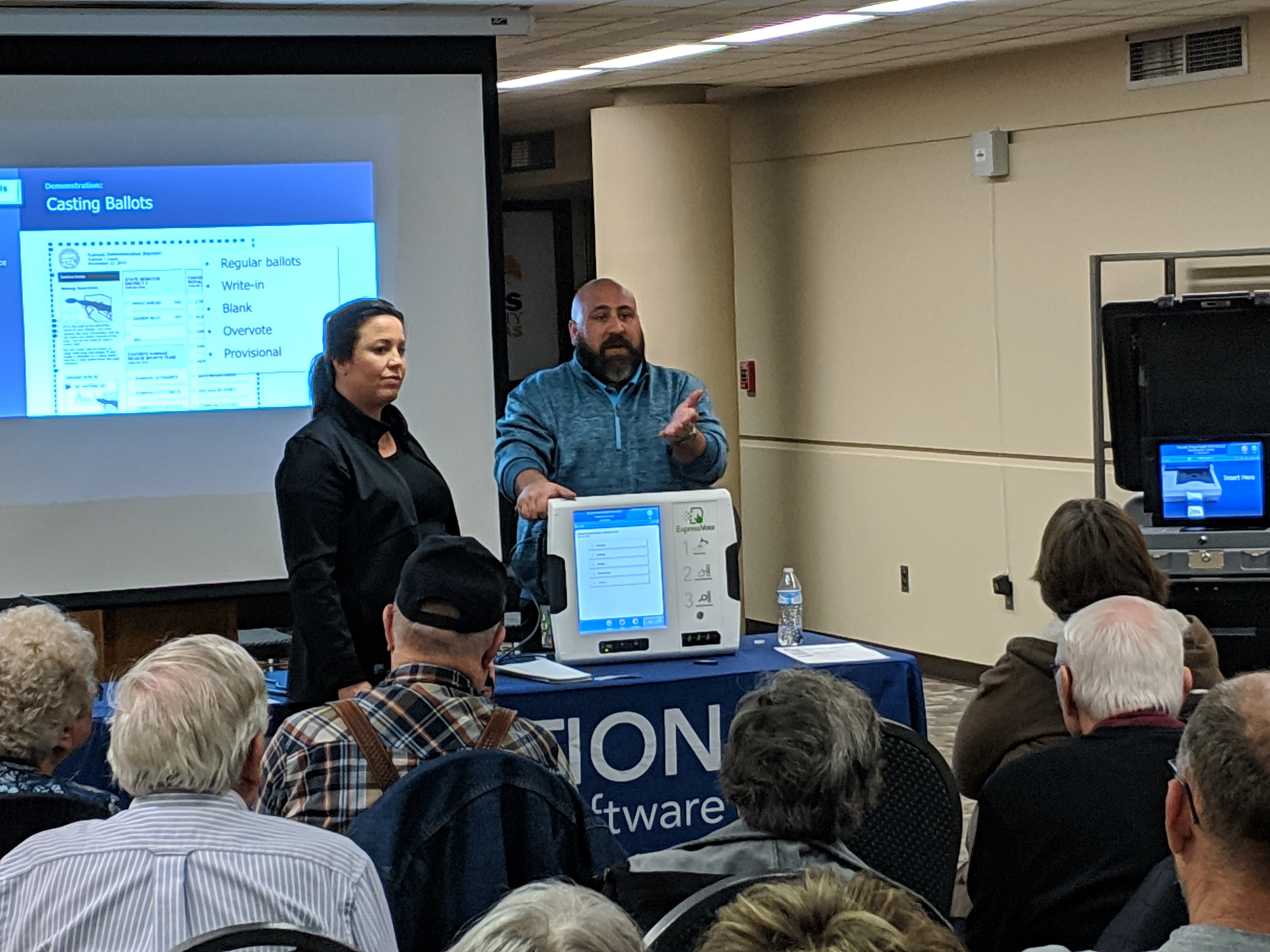
By JONATHAN ZWEYGARDT
Hays Post
Ellis County election officials, workers and voters all got a chance this week to look at the possible future equipment of elections within the county.
Sales representatives from Election Systems & Software (ES&S) of Omaha, Neb., were in Hays on Tuesday to demonstrate new voting equipment as the county and County Clerk and Election Officer Donna Maskus prepares to purchase new equipment.
The representatives showed off a paper ballot scanner and tabulator, the DS200 and the ExpressVote voting system, a touch screen voting machine, to a large group of interested parties at the County Administrative Center.
Among those in attendance were commissioners Butch Schlyer and Dustin Roths, Administrator Phillip Smith-Hanes, Hays Mayor and Chair of the Ellis County Democratic Party Henry Schwaller, and several poll and election workers.
The one major difference between the machines presented Tuesday and the current iVotronic machines owned by the county is that the ES&S machines use of paper ballots.
Legislation approved in 2018 requires that all Kansas counties be able to perform a post-election audit. The audit will require a hand recount of paper ballots. The iVotronic machines do not produce a paper ballot.
“The whole nation is focused on paper,” Angie Frison, Kansas Sales Manager for ES&S said. “Real soon, our whole company thinks that it’s going to be mandated that any touchscreen, or any DRE, is what they call the touch screens without paper, are going to be banned from the nation entirely.”

When using the voting machines demonstrated Tuesday, the voter is given a paper ballot. If the voter choses a regular ballot, they would fill it out like normal and then insert it into the DS200.
The Express voting machine, which also meets all Americans with Disabilities Act requirements, also uses paper. The voter is given a blank sheet that is inserted into the machine and the voters selections are then transferred to the ballot through a thermal process. That ballot is also inserted it into the DS200.
The DS200 scans the ballots and then results are saved on an encrypted USB flash drive while the paper ballots are stored in a locked bin located in the bottom half of the machine.
The USB drive and the paper ballots are all the election workers have to collect at the end of the day and return to election headquarters.
The USB is then inserted into a secure computer that contains ES&S election software that helps to tally the votes. It also has the ability to gather write-in votes that will be counted.
The machines are not connected to the internet, so they cannot be accessed by hackers through the web, and the computer that contains the software that produces the results does not have internet access and the user can only access the ES&S voting software.
Currently the county has 69 iVotronic machines that are deployed at 10 polling sites throughout the county.
Frison said because they estimate it takes about the same time to vote on the current iVotronic machine as it does to vote on a paper ballot, they believe the county would need to have a similar number of paper ballot voting booths.

She also said they recommend one DS200 for 3,500 voters.
Clerk Maskus said they do not plan on changing the number of polling locations and expect they could have one of each machine at each polling site.
According to the ES&S sales representatives the DS200 costs approximately $5,700 and the ExpressVote will cost $3,700 — money that both Clerk Maskus and Commissioner Roths said the county has set aside to purchase new voting equipment.
“I like the idea of paper ballots, it gives the voters that reassurance that there is a paper trail,” Roths said.
He also added that he liked the ES&S was from the Midwest and that they are the company that has been selected by states such as Utah to handle all of their voting equipment.
Maskus said the county plans on having one more vendor demonstrate equipment before making a purchase later this year.
